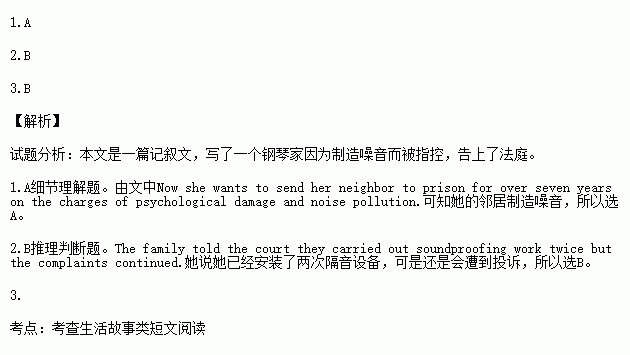题目内容
To most people, noise pollution is a jet flying over their head. For one Spanish woman, it is a neighbor playing the piano. The woman has taken her neighbor to court. Now she wants to send her neighbor to prison for over seven years on the charges of psychological damage and noise pollution.
In a country known for its noisiness, the case has raised eyebrows. Neighbors often complain about street noise in Spain, but people seeking prison time for someone practicing the piano is unheard of. At the trial, Sonia Bosom says she has been suffering noise pollution up to now due to the practice sessions of Laia Martin, who lives below her. Martin, 27, didn’t admit that she played at home that often, saying she took regular classes in other towns and mostly practiced at home on the weekends.
On the first day of the trial, the newspaper reported that Bosom told the court she now hated pianos so much that she couldn’t even stand seeing them in a film.
Bosom says years of hearing constant playing has caused her “psychological injury”. Medical reports show she has suffered from a variety of problems, including insomnia (失眠), anxiety, and panic attacks.
She says tests by local authorities have found that the sound levels made by the piano are up to 10 decibels (分贝) higher than the limit. City authorities have asked the family several times to either stop the piano playing or soundproof (隔音) the room. The family told the court they carried out soundproofing work twice but the complaints continued.
The court hasn’t made a final decision. A spokeswoman says the trial will end before May.
1.Bosom wants to send Martin to prison because _______.
A. Martin’s playing the piano damaged her health
B. Bosom suffered from heart attack
C. Martin refused to take regular classes in other towns
D. Martin flew a jet over her head
2.How did Laia Martin respond to the complaints?
A. She stopped playing the piano.
B. She soundproofed the room.
C. She didn’t admit she played at home.
D. She took her neighbor to court.
3.Which of the following may probably be the best title for the passage?
A. A 7-year Sentence Caused by the Piano
B. Pianist Charged with Noise Pollution
C. Health Problems of a Spanish Woman
D. Actions Against Noise by Local Authority
 世纪百通期末金卷系列答案
世纪百通期末金卷系列答案
